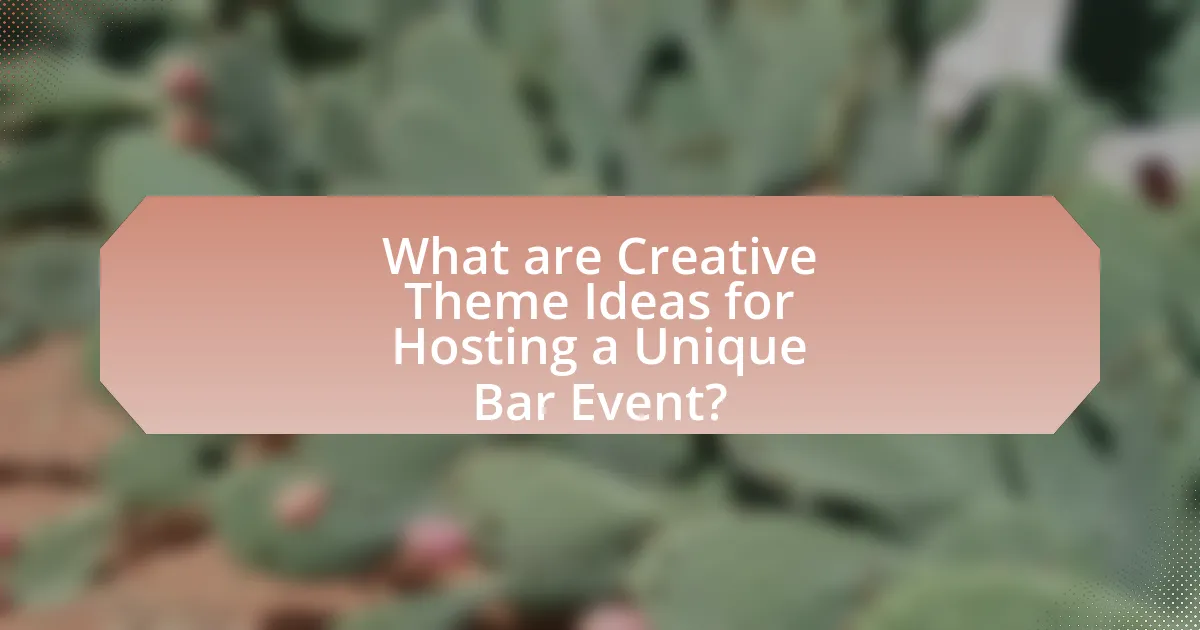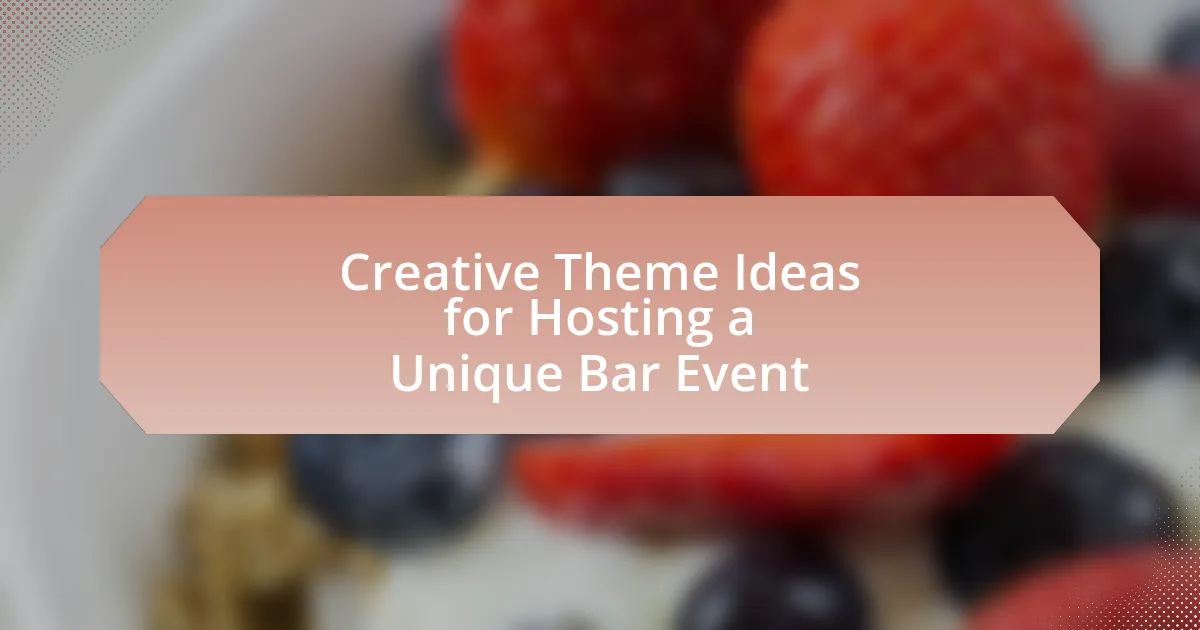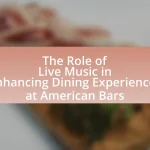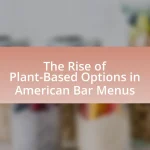Creative theme ideas for hosting a unique bar event are essential for enhancing guest engagement and creating memorable experiences. Popular themes include speakeasy nights, tropical luaus, and seasonal celebrations, each offering distinct decor, drink specials, and activities that resonate with attendees. The article explores how cohesive themes can influence the atmosphere, encourage social interaction, and differentiate events in a competitive market. Additionally, it provides practical tips for implementing these themes effectively, ensuring that all elements align with the chosen concept to maximize guest enjoyment and satisfaction.

What are Creative Theme Ideas for Hosting a Unique Bar Event?
Creative theme ideas for hosting a unique bar event include a speakeasy night, where guests dress in 1920s attire and enjoy classic cocktails, and a tropical luau, featuring tiki drinks and Hawaiian decorations. These themes create immersive experiences that engage attendees and enhance the atmosphere. For instance, a speakeasy night can incorporate jazz music and vintage decor, while a tropical luau can offer hula dancing and themed games. Such thematic elements not only attract guests but also encourage social interaction, making the event memorable.
How can themes enhance the experience of a bar event?
Themes can enhance the experience of a bar event by creating a cohesive atmosphere that engages guests and encourages participation. A well-defined theme can influence decor, drink specials, and entertainment, making the event more memorable. For example, a tropical theme can lead to vibrant decorations, fruity cocktails, and island-inspired music, which collectively immerse attendees in a unique experience. Research indicates that themed events can increase customer satisfaction and retention, as they provide a distinctive experience that stands out from regular outings.
What elements contribute to a successful theme at a bar event?
A successful theme at a bar event is primarily influenced by the cohesiveness of the theme, the selection of appropriate decor, and the alignment of the menu with the theme. Cohesiveness ensures that all elements, from invitations to activities, reflect the chosen theme, creating a unified experience for attendees. Appropriate decor enhances the atmosphere, making it visually appealing and immersive, while a themed menu, including drinks and food, reinforces the concept and engages guests’ senses. For example, a tropical theme might feature tiki cocktails and palm decorations, which together create an inviting environment that encourages participation and enjoyment.
How do themes influence guest engagement and enjoyment?
Themes significantly enhance guest engagement and enjoyment by creating immersive experiences that resonate with attendees. When a bar event adopts a specific theme, it establishes a cohesive atmosphere that encourages participation and interaction among guests. For instance, themed events like “Tropical Luau” or “1920s Speakeasy” provide visual and auditory cues that stimulate excitement and curiosity, leading to increased social interaction. Research indicates that themed environments can elevate mood and satisfaction levels, as evidenced by a study published in the Journal of Consumer Research, which found that thematic elements can enhance emotional responses and overall enjoyment during social gatherings. Thus, the integration of themes in bar events not only captivates guests but also fosters a memorable experience that promotes engagement.
What types of themes are popular for bar events?
Popular themes for bar events include tropical luau, speakeasy, sports, and holiday celebrations. The tropical luau theme often features tiki drinks and Hawaiian decor, appealing to those seeking a fun, relaxed atmosphere. Speakeasy themes recreate the ambiance of the Prohibition era, emphasizing craft cocktails and vintage attire, which attracts patrons interested in a unique, immersive experience. Sports themes capitalize on major sporting events, encouraging fans to gather and celebrate with themed drinks and decorations. Holiday celebrations, such as Halloween or New Year’s Eve, draw crowds with festive decorations and special drink menus tailored to the occasion. These themes are widely recognized for enhancing the social experience and increasing patron engagement at bar events.
What are some seasonal themes that can be implemented?
Seasonal themes that can be implemented for a unique bar event include summer beach party, autumn harvest festival, winter wonderland, and spring garden party. Each theme offers distinct decor, drink specials, and activities that align with the season. For instance, a summer beach party can feature tropical cocktails and beach-themed decorations, while an autumn harvest festival can highlight seasonal ingredients in drinks and food, such as pumpkin spice cocktails. These themes not only enhance the atmosphere but also attract customers by creating a memorable experience that resonates with seasonal festivities.
How can cultural themes be integrated into a bar event?
Cultural themes can be integrated into a bar event by incorporating elements such as traditional music, cuisine, decor, and attire that reflect a specific culture. For instance, hosting a Mexican-themed night could involve serving authentic dishes like tacos and margaritas, playing mariachi music, and decorating with vibrant colors and traditional artifacts. This approach not only enhances the atmosphere but also educates patrons about the culture, creating an immersive experience. Research indicates that themed events can increase customer engagement and satisfaction, as they provide unique experiences that differentiate the bar from competitors.
Why is it important to choose a unique theme for a bar event?
Choosing a unique theme for a bar event is crucial because it differentiates the event from others, attracting a specific audience and enhancing the overall experience. A distinctive theme creates a memorable atmosphere that encourages guest engagement and participation, leading to higher attendance rates. For instance, events with unique themes can increase social media sharing, as attendees are more likely to post about their experiences, thus providing organic marketing. According to a study by Eventbrite, 70% of attendees are more likely to attend an event with a creative theme, demonstrating the direct impact of thematic uniqueness on event success.
How does a unique theme differentiate a bar event from others?
A unique theme differentiates a bar event from others by creating a distinctive atmosphere that attracts specific audiences and enhances the overall experience. For instance, themed events like a 1920s speakeasy or a tropical luau offer guests an immersive experience that goes beyond standard bar offerings, incorporating decor, music, and specialized drinks that align with the theme. This targeted approach not only fosters a memorable experience but also encourages social interaction among attendees who share similar interests, ultimately leading to increased customer loyalty and repeat attendance.
What impact does a unique theme have on marketing and promotion?
A unique theme significantly enhances marketing and promotion by creating a distinct identity that attracts target audiences. This differentiation allows businesses to stand out in a crowded market, leading to increased brand recognition and customer engagement. For instance, events with unique themes can generate buzz on social media, as attendees are more likely to share their experiences, thereby amplifying reach and visibility. Research indicates that themed events can increase attendance by up to 30%, demonstrating their effectiveness in drawing crowds and fostering a memorable experience.
How can you transition from theme ideas to practical implementation?
To transition from theme ideas to practical implementation for a unique bar event, begin by developing a detailed plan that outlines the theme’s key elements, such as decor, menu, and activities. This structured approach ensures that all aspects of the theme are cohesively integrated into the event. For instance, if the theme is a tropical paradise, the plan should specify tropical decorations, themed cocktails, and relevant entertainment like a limbo contest.
Next, allocate a budget that aligns with the planned elements, ensuring that each component is financially feasible. Researching similar events can provide insights into costs and help refine the budget.
Finally, create a timeline that includes milestones for each stage of the implementation process, from securing a venue to finalizing the menu. This timeline should be adhered to strictly to ensure that all preparations are completed on schedule. By following these steps, the transition from theme ideas to practical implementation becomes a systematic and manageable process.
What considerations should be made when selecting a theme?
When selecting a theme for a bar event, key considerations include the target audience, the venue’s atmosphere, and the overall purpose of the event. Understanding the demographics and preferences of the attendees ensures that the theme resonates with them, enhancing engagement and enjoyment. The venue’s characteristics, such as size, decor, and ambiance, should align with the chosen theme to create a cohesive experience. Additionally, the event’s purpose—whether it’s a celebration, networking, or a promotional event—should guide the theme selection to ensure it meets the intended goals. These considerations are crucial for creating a memorable and successful bar event.
What are some detailed examples of creative themes for bar events?
Some detailed examples of creative themes for bar events include a “Tropical Luau” theme, where guests enjoy tiki cocktails and Hawaiian-inspired decor, and a “Speakeasy Night,” featuring vintage cocktails and a prohibition-era dress code. Another example is a “Murder Mystery” theme, where attendees participate in solving a fictional crime while enjoying themed drinks. Additionally, a “Wine and Paint Night” allows guests to sip wine while creating art, fostering a relaxed and creative atmosphere. Each of these themes enhances the bar experience by providing unique activities and immersive environments that encourage social interaction and engagement.
How can a ‘Tropical Paradise’ theme be executed effectively?
To execute a ‘Tropical Paradise’ theme effectively, incorporate vibrant colors, tropical decorations, and themed cocktails. Utilizing bright hues like turquoise, coral, and yellow creates an inviting atmosphere reminiscent of tropical locations. Decorations such as palm leaves, tiki torches, and floral arrangements enhance the theme, while offering signature cocktails like piña coladas and mojitos adds to the experience. Research indicates that themed environments significantly increase guest enjoyment and engagement, making the execution of a ‘Tropical Paradise’ theme not only visually appealing but also impactful for event success.
What are the key components of a ‘Retro Night’ theme?
The key components of a ‘Retro Night’ theme include nostalgic decor, vintage music, themed costumes, and classic cocktails. Nostalgic decor often features items from past decades, such as neon lights, vinyl records, and retro furniture, creating an immersive atmosphere. Vintage music playlists typically consist of hits from the 70s, 80s, or 90s, enhancing the theme and encouraging guests to dance. Themed costumes invite attendees to dress in styles representative of the chosen era, fostering engagement and fun. Classic cocktails, such as martinis or old fashioneds, reflect the drinking culture of the past, adding to the authenticity of the experience.
What practical tips can help ensure the success of a themed bar event?
To ensure the success of a themed bar event, it is essential to create a cohesive theme that resonates with your target audience. This involves selecting a specific theme, such as a decade, movie, or cultural celebration, and designing all aspects of the event—decor, drinks, music, and staff attire—around that theme. For example, a 1980s theme could feature neon decorations, classic 80s music, and cocktails inspired by that era.
Additionally, effective marketing strategies, such as social media promotions and collaborations with local influencers, can significantly increase attendance. Research indicates that events with strong promotional efforts see up to 30% higher participation rates. Furthermore, engaging activities, such as themed contests or live performances, can enhance the guest experience and encourage social sharing, further promoting the event.
Finally, gathering feedback post-event can provide valuable insights for future themed events, ensuring continuous improvement and success.


